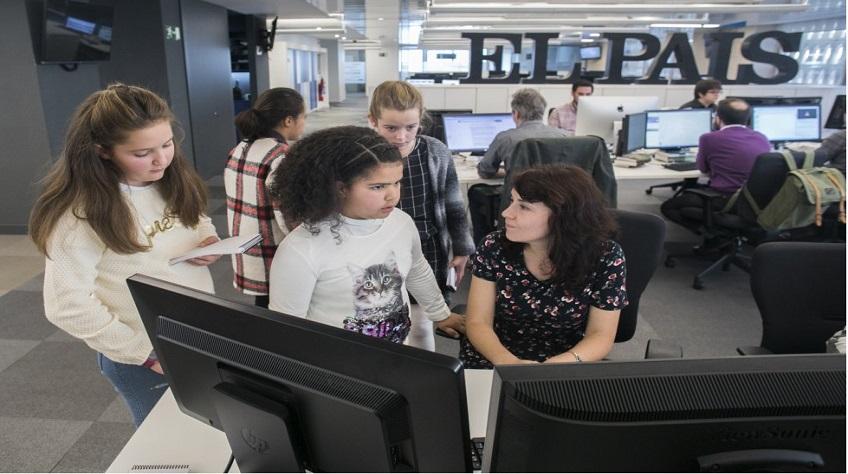News
Universal Children's Day: Silence, Children talking!
21-11-2017

Universal Children's Day 2017 champions the right of children to be heard
A group of 17 budding young journalists were given the run of EL PAÍS last week. The children, armed with notepads, cameras, press cards and boundless enthusiasm, conducted interviews with department heads, photographed everything in their path, produced graphics and illustrations, and even led the regular meetings on content, during which editors discuss the biggest issues of the day. It was the newspaper’s way of contributing to the celebration of Universal Children's Day organized by Unicef this year under the slogan #KidsTakeOver.
To celebrate this year's Universal Children’s Day, UNICEF invited children from 130 countries around the world to take over key roles in media, politics, business, sport and entertainment. Meanwhile, a survey conducted online by Unicef with more than 11,000 children between the ages of 9 and 18 in 14 countries and published on Monday enabled children to voice their opinions about the world they live in. And the survey shows that the biggest concerns of children are terrorism and education (as highlighted by 65% of respondents), as well as violence, bullying, poverty and the treatment of refugees and migrants.
What’s clear is that children have something to say. Most notably on serious issues. However, according to the UNICEF survey, most children feel that their voice is not taken into account. The celebration of Universal Children's Day on Monday not only champions their right to speak out, but also serves to remind us all that their voice benefits all of society.
"The voice of children is largely silenced," says Javier Martos, executive director of Unicef’s Spanish Committee. "Their opinions come across as funny and risible and we find it hard to believe that their opinions could well improve our lives. If their ideas are to become part of the policies that affect them, it is crucial that we increase opportunities for children's participation in environments such as hospitals, schools and at a municipal level." Universal Children's Day is held every year on November 20, anniversary of the adoption of the 1989 Convention on the Rights of the Child, which all countries in the world have ratified except the United States.
Martos noted that while much progress has been made since then, there is still some way to go before all children, everywhere, fully enjoy their rights. "Children used to be considered mere objects and adults’ only obligation was to satisfy their needs. We are making headway, but there are still considerable challenges, especially in the context of humanitarian crises".
Millions of children worldwide are deprived of their right to be children, including 385 million children living in extreme poverty, according to UNICEF figures. 15,000 children under the age of 5 still die every day from preventable illnesses. One in four lives in countries affected by conflict, natural disasters, epidemics and other emergencies. And forced labor affects 152 million children around the world, one in ten globally, warns the International Labor Organization, almost half of these involved in activities that are dangerous to their health and safety. Although infant mortality has been halved in recent decades, 5.6 million children still die each year from preventable causes. Tellingly, one in 12 children in the world have worse prospects than their parents, according to a UNICEF study this year.
The World Association of Early Childhood Educators (AMEI-WAECE) is even harsher when it comes to evaluating progress in the wake of the Convention on the Rights of the Child, calling it a "masterpiece of fantasy literature" in a press release sent to media on the occasion of Universal Children's Day. AMEI believes that the principles of the Convention remain "utopian" even for developed countries such as Spain, which ranks third in the EU for child poverty.
Inequality also affects the education sector: worldwide, 264 million children and adolescents are not being schooled and if tough action is not taken, more than 60 million children will be outside the school system in 2030.
Mikel Egibar, responsible for education at the children’s rights NGO Educo, says we need to take urgent measures in both primary and secondary education. "We are concerned about the trend towards privatization and outsourcing that we are currently witnessing. We must revindicate education as a basic right," he says.
But it is not just about access to education. Egibar notes that some 250 million children, even if they do go to class, are not provided with quality education. "They have to be put at the center of the educational process. For this to take place, major investments are needed, but we also have to change our approach and focus on respect and fair treatment of children," he stresses.
"Spain is no country for children"
Much work needs to be done in Spain, where one in three children live at risk of social exclusion. "We face a paradox," says Andrés Conde, director general of Save the Children in Spain. “While the family is rated as extremely important among Spaniards, Spain is no country for children," he said, stressing that violence, poverty and lack of opportunity are much more pronounced among those under the age of 18.
Conde criticised the invisibility of child poverty in the absence of national statistics, claiming that it’s actually very widespread. "In Spain, 1.4 million children live in severe poverty, meaning that a family of four has just 930 euros to cover all their needs," he explains. This condition, besides being irreversible (it’s impossible to later undo the damage done by the hardships of the first five years of life), is also hereditary. "These are unacceptable figures and economic recovery is not being accompanied by a firm commitment to end this scandal."
Migrant unaccompanied minors represent a particularly vulnerable group. "More and more young people are coming across the southern border and our social safety net needs to be reformed to safeguard their rights."
Source: El País
It may interest you



